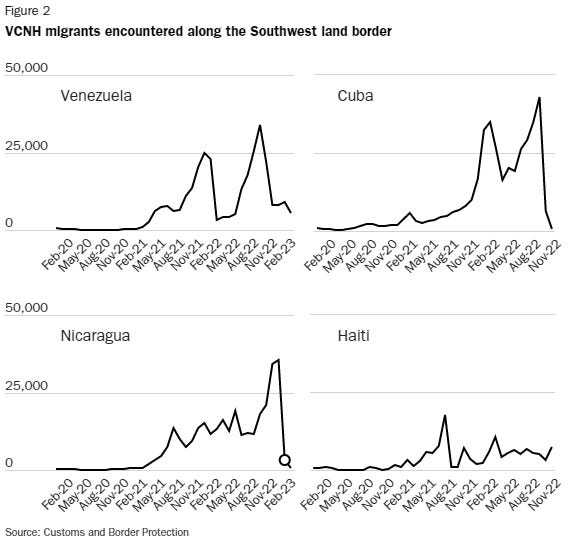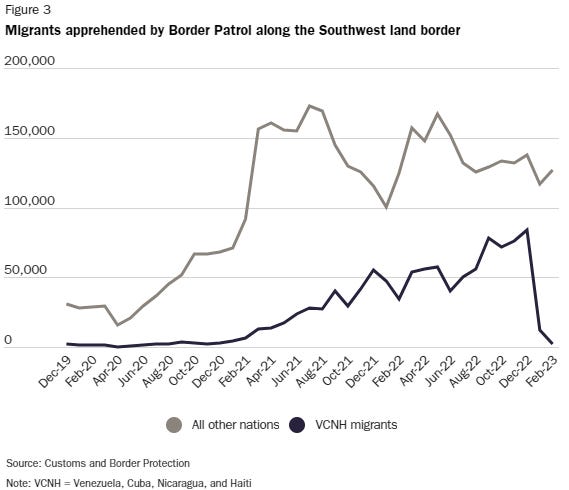Biden's Border Immigration Policy Is Still Reducing Border Crossings and Illegal Immigration
Expanding legal immigration reduces illegal immigration, again
Encounters of migrants crossing the southwest (SW) border with Mexico are down 39 percent from December 2022 to February 2023. President Biden's immigration and border plan that expanded legal migration to the United States through humanitarian parole should take credit for this decline. Under Biden's plan, up to 30,000 migrants from Venezuela, Cuba, Nicaragua, and Haiti (VCNH migrants) are allowed to enter the United States legally each month through humanitarian parole. As a result, more of them are waiting to come legally rather than attempting to cross illegally.
In February 2023, the number of VCNH migrants encountered, found inadmissible by Customs and Border Protection (CBP), or apprehended by Border Patrol decreased by 84 percent compared to December 2022. The number of VCNH migrants showing up at the border fell from 91,344 in December to 22,084 in January and then further down to 14,381 in February (see Figure 1).
This trend supports Cato's theory that legal migration discourages illegal immigration and border crossings. Non-VCNH migrants who do not have the option of humanitarian parole fell by only 12.5 percent from 160,651 in December 2022 to 134,192 in January and rose again to 140,617 in February. Almost 80 percent of the total decline in encounters along the border from December to February comes from a reduction in VCNH migrants.
VCNH migrants can apply for humanitarian parole from their home countries, and they must meet all health standards, be screened for security purposes, and have a U.S. sponsor. Once approved, they can fly to the United States rather than paying a smuggler to bring them to the U.S. SW border. Once here, they can reside for two years, they can apply for a work permit, and have little recourse to welfare. Importantly, the President can extend the two-year residency at any time. If nearly 30,000 people are admitted every month from VCNH countries, then the Biden immigration and border plan could be the largest immigration liberalization since 1965.
Looking at the individual countries reveals a more complicated reality. For example, Venezuelans have had some access to humanitarian parole since October 2022. The number of Venezuelans who came to the SW border without authorization dropped by 64 percent from October to November of 2022, rose slightly in December and January but fell again in February (Figure 2). Their numbers fell by 2,607 between December and February. Haitians, another group with access to humanitarian parole before Biden's January immigration plan, increased from 5,138 in December 2022 to 7,430 in February, a 45 percent increase.
However, the number of people showing up at the border from Nicaragua and Cuba dropped substantially from December to February (Figure 2). Nicaraguans dropped from 35,387 in December to 639 in January, a 98 percent decline. Cubans dropped by 98 percent, from 42,653 in December to 753 in February. Those are enormous declines for people from countries most recently added to humanitarian parole.
Figures 1 and 2 look at all encounters by CBP along the Southwest border, which includes apprehensions by CBP's subcomponent agency of Border Patrol. Apprehensions by Border Patrol are an even better way to look at the chaos along the border because that agency apprehends migrants trying to cross illegally while the other components of CBP often encounter migrants who aren't trying to evade capture. Of course, not all migrants apprehended by Border Patrol are trying to escape detention, but they are more likely to.
Border Patrol apprehended 84,190 migrants from VCNH countries in December 2022, the month before Biden announced his new border plan. In February, those numbers fell by 98 percent to 2,050 (Figure 3). The number of migrants from other non-VCNH countries apprehended by Border Patrol fell just 8 percent from 137,503 to 126,827 over the same period but rose slightly from January to February.
The number of VCNH migrants apprehended by Border Patrol fell over the entire period that humanitarian parole was available for each country (Figure 4). Biden's border plan resulted in the number of Cubans and Nicaraguans apprehended falling by 99 percent, Haitians by 32 percent, and Venezuelans by 77 percent.
Biden's border plan reduced chaos along the Southwest land border in a short period. That's good for its own sake, helps clear the air for a serious immigration debate, and is politically astute for Biden, which means that the incentives for good policy are politically aligned and sustainable. Second, the Biden plan increases legal immigration when U.S. labor demand is still high. Third, it defunds criminal networks and cartels by channeling many migrants into the legal system and away from the black market. If President Biden extends humanitarian parole to Hondurans, Salvadorans, Guatemalans, Colombians, and Ecuadorians, then he could make even more progress in reducing illegal migration and chaos along the Southwest border.






It's quite obvious, when given an option to follow an easy set of rules most people choose to do so
If you make it easier to do something legally which is currently mostly illegal, the illegal share of the total will decline. This argument is often used to argue for legalising prostitution, hard drug use, gambling etc. I don’t say there’s nothing to this argument. The USA’s experience with alcohol prohibition was not great, after all. But the problem is, however lax you make the laws, there’s still an edge. You legalise marijuana and cocaine, but that still leaves fentanyl.
With immigration, as long as you exclude any category of person at all from having an automatic right to enter your country at whim, people in that excluded category will have an incentive to try and enter illegally. Exclude those with criminal convictions from legal immigration, and those people will try to immigrate illegally.
At this point, it’s probably worth pointing out that there are countries which make legal immigration relatively hard, but which don’t thereby suffer from super-high levels of illegal immigration: Japan and South Korea, for instance.